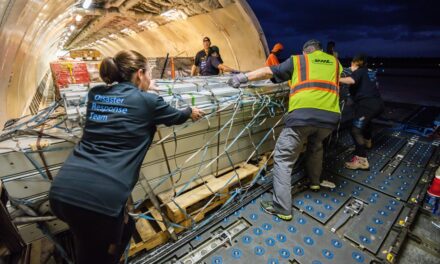
DPD extends Baltic market leadership with new depot
DPD is expanding capacity for its fast-growing business in the Baltic region with a new depot at the Lithuanian port of Klaipeda for international imports to be distributed in Eastern Europe and the CIS region.
In 2007, DPD increased its import volumes to the Baltic countries of Latvia, Lithuania and Estonia by 40 pct to around ten million parcels. This helped the GeoPost subsidiary to expand its CEP market share in the Baltics from 23 pct to 28 pct. In domestic shipping within the Baltic States the three companies DPD Latvija, DPD Lietuva and DPD Eesti have a market share of as much as 46 pct.
In order to cope with this volume growth, DPD opened a parcel sorting centre in the free-trade zone of the port of Klaipeda in western Lithuania in May. The depot has a total of 46 loading bays and its current capacity is 2,000 parcels an hour, which can however be expanded substantially. The centre is intended specifically to handle the rising volumes of international shipments which arrive at Klaipeda by sea and by rail from all around the world.
DPD said that it has grown strongly in the Baltic region in recent years. It has established a rapidly growing network, based on an operational infrastructure featuring three hubs, 29 depots and a fleet of 540 vehicles. Within the three countries DPD has a workforce of 750 employees backed up by self-employed transport operators. In Riga the company opened the largest sorting centre of the whole Baltic region only last year, with a sorting capacity of 6,000 parcels an hour.
DPD is expanding capacity for its fast-growing business in the Baltic region with a new depot at the Lithuanian port of Klaipeda for international imports to be distributed in Eastern Europe and the CIS region.
In 2007, DPD increased its import volumes to the Baltic countries of Latvia, Lithuania and Estonia by 40 pct to around ten million parcels. This helped the GeoPost subsidiary to expand its CEP market share in the Baltics from 23 pct to 28 pct. In domestic shipping within the Baltic States the three companies DPD Latvija, DPD Lietuva and DPD Eesti have a market share of as much as 46 pct. “DPD has tripled its parcel volumes in the Baltic region since 2004,” stated Arnold Schroven, CEO of the international DPD organisation.
In order to cope with this volume growth, DPD opened a parcel sorting centre in the free-trade zone of the port of Klaipeda in western Lithuania in May. The depot has a total of 46 loading bays and its current capacity is 2,000 parcels an hour, which can however be expanded substantially. The centre is intended specifically to handle the rising volumes of international shipments which arrive at Klaipeda by sea and by rail from all around the world.
“DPD is integrating itself more and more into global logistics chains,” Schroven explained. “For example, at the new DPD sorting centre in Klaipeda we ensure that parcels which arrive by container from Asia are sorted as fast as possible and then distributed throughout the entire Baltic region.”
Klaipeda has a dual logistics function as Lithuania’s only commercial port and with an important rail link which leads via Vilnius, Minsk and Kiev to the Ukrainian port of Odessa (a distance of 1734 km covered in 55 hours). In addition, it links up with an important trans-European road corridor (IXB) which connects the countries around the Baltic with the Black sea region. The significance of Odessa and its hinterland connections is increasing because maritime links with Turkey and other countries in Central Asia have expanded dramatically since the political opening up of the Russian Federation.
DPD said that it has grown strongly in the Baltic region in recent years. It has established a rapidly growing network, based on an operational infrastructure featuring three hubs, 29 depots and a fleet of 540 vehicles. Within the three countries DPD has a workforce of 750 employees backed up by self-employed transport operators. In Riga the company opened the largest sorting centre of the whole Baltic region only last year, with a sorting capacity of 6,000 parcels an hour.













